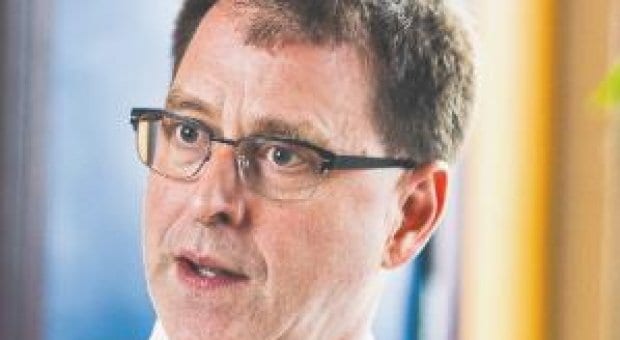
NDP Leader Adrian Dix sat down with Xtra in early April, just before the election was officially called. Xtra's repeated attempts to arrange an interview with Liberal Leader Christy Clark were unsuccessful. Credit: Shimon Karmel

Credit: Shimon Karmel
“No-o.”
With a firm shake of his head, Adrian Dix dismisses any notion that he’s confident he’ll be BC’s new premier after May 14.
“It’s up to the voters; they get to decide,” he says.
That was at the beginning of April as the election campaign was about to shift into higher gear, when he and the NDP were still coasting on comfy leads.
“I can be confident that I’ll run a good campaign, confident that we could run a good government, confident that, if elected, I’ll be a good premier,” Dix says, shirtsleeves in their trademark rolled-up-just-past-the-elbows position.
Now the election seems up for grabs.
A recent Angus Reid poll suggests the double-digit lead the NDP enjoyed for the last year or so over the Liberals is down to single figures – just seven points or fewer apart.
Dix points out that at least 50 percent of eligible voters didn’t bother to vote in the last provincial election.
“People need to vote if they want to see [NDP] voices making decisions on their behalf,” he says.
His party’s platform is sprinkled with language that has earned the NDP the moniker of being the social-justice party that doesn’t leave the vulnerable behind: reducing inequality, creating affordable housing, fostering sustainable living, building better relations with First Nations.
But Dix, who has a reputation for being a policy wonk, doesn’t give remarkably specific answers to what he thinks tops the queer community’s concerns, except to pinpoint the pervasive problem of bullying and to refer to Vancouver-West End MLA Spencer Chandra Herbert’s introduction of a private member’s bill to include transgender people in the BC Human Rights Code.
Rather, Dix sees the queer community as sharing the same priorities as the electorate in general. “I think they are the priorities that everybody has: high-quality education and healthcare system, support for seniors, ensuring that child poverty is addressed,” he says.
On the bullying front, Dix offers Liberal Premier Christy Clark a nod, saying some of the programs her government has introduced have raised public awareness of the issue.
But young people are still particularly vulnerable to homophobia and other forms of bullying that need to be addressed throughout BC, he says.
Part of the NDP platform promises to “ensure that students are respected and that policy exists to deal effectively with homophobia, racism, sexism, transphobia and other forms of systemic discrimination.”
“I think there’s a place for a discussion of curriculum in all regards,” Dix says when asked if an NDP government would also introduce more queer issues into the classroom.
“I also think that as much as politicians give broad direction, the development of curriculum is directed by educators. There has to be healthy debate. I don’t know if it’s a platform issue for a political party. Certainly, I think it’s fair that people see themselves reflected in the curriculum, but the curriculum is also a curriculum, and it’s going to deal with a whole variety of issues.”
Chandra Herbert would like to see queer realities better represented in the curriculum. He points to the Corren agreement, signed yet sparingly implemented by the Liberal government as part of a human rights complaint settlement in 2006.
Asked if he sees the NDP’s promise to deal with homophobia as a first-session item, Chandra Herbert says it may require legislation and may take some time. “I don’t want to promise something will happen in five days or 10 days, but our kids demand it.”
Believing in equality demands support for those who are being attacked, he says, when asked if an NDP government will stand up to potential backlash from conservative parents opposed to addressing homophobia. “Gay, lesbian, bi and trans folks are British Columbians and are just as equally deserving of protection under the law and currently face high rates of violence, and we as a government won’t stand for it.”
The inclusion of trans people as a protected group in the provincial human rights code is also a priority, Chandra Herbert says.
“We will make it law,” he promises. “I cannot wait for the day to make it happen. We haven’t got this far without trans people telling us this is a priority.”
The NDP’s arts and culture critic also thinks it’s vital to foster the creative economy – considered a key sector for the gay community.
Several community groups, including the Vancouver Queer Film Festival, the Out in Harmony choir and the Frank Theatre Company (formerly Screaming Weenie Productions), have had to scramble to stay solvent in the last few years after the Liberals cut millions in arts funding in 2009.
“How do we get to know each other as people if we can’t see each other through the arts?” Chandra Herbert asks.
The BC Liberal platform devotes two pages to its planned $60 million reinvestment in arts and culture. “This includes $24 million to the BC Arts Council,” the document states.
Chandra Herbert says the NDP also plans to increase investment to the arts council: $24 million in the first budget and up to $29 million by 2015/16. “That’ll help queer groups and non-queer groups perform, whether that’s in GLBT venues or general venues,” he says.
He would like to see the province review its liquor laws to facilitate holding events in non-traditional venues, such as warehouses, galleries, theatre spaces and on the street. “That will help LGBT event promoters. It’ll make sure they make money, but it’ll also lead to more fun events for us, too.”
He says the money is there to follow through on these proposals with the fiscal plan the NDP has put forward. “I’d say we wouldn’t put forward a fiscal plan unless we had a fair amount of confidence we can meet it,” he says. “We also know that it’s hard to predict anything three years from now, let alone one year from now. If revenues improve, there may be the ability to do things faster.”
Affordable housing has been a front-and-centre issue in the municipal and, now, this provincial election.
In its platform, the NDP promises to “build up to 1,500 units of affordable, non-profit, co-operative and rental housing for low- and moderate-income families, seniors and individuals each year.” They say they’ll do this by tapping the existing $250 million Housing Endowment Fund.
“We’re going to have to work with the private sector and with the cities to see more rental housing produced that is essentially market rental housing,” Dix says. “There is significant interest amongst developers to build rental housing, and so, to some degree, we’ve got to make sure we’re facilitating that.”
The Liberal platform says it invested $3.2 billion over the last decade “to provide affordable housing for low-income individuals, seniors and families in communities across the province – and as a result close to 21,000 new housing units have been completed, are under development or have had funding committed.”
Housing critic Randy Helten, of CityHallWatch, says a critical aspect in tackling the housing issue is defining affordability clearly. He says a lack of clarity means governments have great leeway to say they’ve accomplished what they said they would.
Helten says the benchmark that is commonly used suggests that rent should not exceed 30 percent of a person’s income, a calculation West End Residents Association (WERA) volunteer Brent Granby supports.
Granby says there is an urgent need for social housing, an area in which he’d like to see the province invest more. “Realistically, it would be reasonable for the provincial government to do 2,000 units of social housing in Vancouver per year. It should be a line item every year that we’re spending one percent of GDP on social housing.”
Granby says it’s also time to review the Residential Tenancy Act. He says the act’s inadequacies undermine affordability and instead facilitate the “renovictions” that have driven many tenants out of their West End apartments in the last decade.
Chandra Herbert says the NDP plans to close loopholes in the act that allow property owners to evict tenants for renovations and to increase rent based on the higher market value of the surrounding neighbourhood.
Dix is careful to strike a tone of incrementalism in laying out what an NDP government would do once in office.
His mantra is “one step at a time” and acting “modestly and within our means” – perhaps out of a desire to establish distance from the NDP’s so-called Dismal Decade debt-and-deficit past.
While the NDP is perceived as “the caring party,” independent consultant Michael Harding suggests that “the problem for people will be what’s it going to do to the economy.”
Both parties carry baggage, Harding says, pointing to the Liberals’ HST lie and Dix’s forged memo for his former boss.
But despite the Liberals’ baggage and a lukewarm response from ratings agencies, the ruling party hasn’t done a bad job fostering economic growth, he says. “I look at the unemployment rates in Spain and Greece, and in the context of that, I think this province is doing pretty well. I think the big challenge the NDP is going to have is convincing everybody about their economic plan.”
Dix has repeatedly assured that the NDP has anticipated the costs of all its planned expenditures and factored them into carefully planned, transparent, deficit budgets for three years.
The NDP “probably did too many things and not enough of them well,” he concedes of the party’s 1990s spending. Still, he is proud of his party’s social-justice legacy in a supposedly dismal period.
It was during that time that the NDP “extended and supported rights for gay and lesbian people,” he points out.
Dix says he’s “very proud” that the West End’s first openly gay MLA ran on the NDP ticket in the 1990s.
He’s also “very proud of our decision to ensure that couples are allowed to adopt – so I think that we want to continue that.”
The party’s commitment to the gay community remains strong, he says.
“We have five out candidates, significant people on our team who will be there and clearly play a major role in the government. Our record, our commitment, tells us that [queer] issues will be addressed, not with any look-at-us flamboyance, but with a seriousness of people who want to see justice and change.”
For Chandra Herbert, Dix stands out because of his “incredible intellect,” his curiosity and his willingness to trust his teammates’ expertise.
“Whether or not it’s been on human rights issues, or creative economy issues, or tourism issues, in my critic portfolio, he’s turned to me as the one who’s been the lead on those issues for the party and supported me in developing the policy proposals that we’re putting forward,” he says.
“There’s no one-man show.”


 Why you can trust Xtra
Why you can trust Xtra


